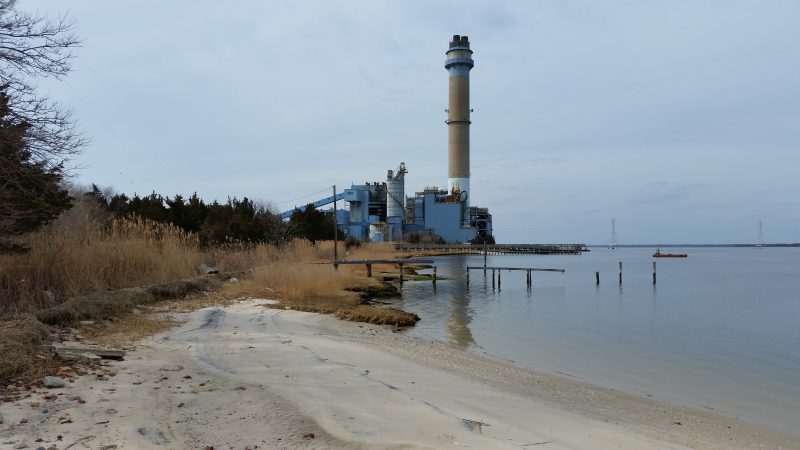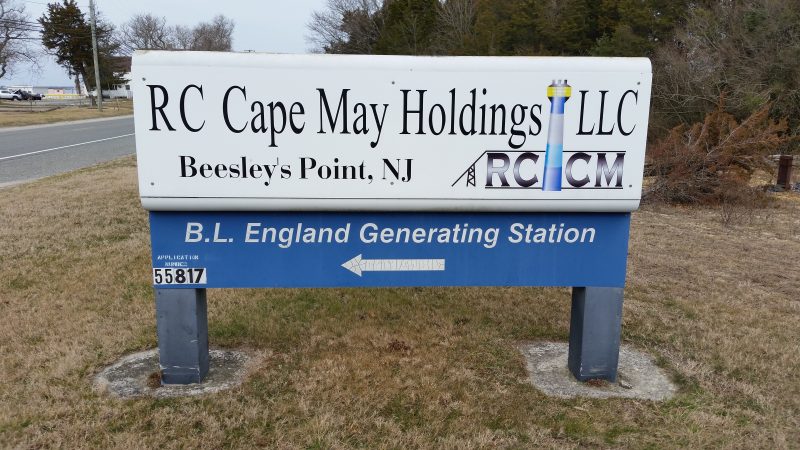RC Cape May Holdings LLC, the plant owner, wants to use the pipeline to convert the facility to natural gas.
 By Donald Wittkowski Bob Barr can see the massive outline of the B.L. England power plant and its towering smokestack in Beesleys Point across the marshlands from his Ocean City home. The plant has been operating for decades, but Barr fears it may shut down as early as May, taking its jobs and local tax benefits with it. Hoping to keep the facility open, Barr disclosed Wednesday that he intends to vote in favor of a plan to run a 22-mile natural gas pipeline to the plant through South Jersey’s environmentally protected Pinelands. Although best known as being an Ocean City councilman, Barr holds another key position as a member of the New Jersey Pinelands Commission, the agency that oversees the 1.1-million-acre Pinelands preserve. The 15-member commission is scheduled to vote on the pipeline when it meets 9:30 a.m. Friday at the Crowne Plaza Hotel in Cherry Hill. In an interview, Barr said he has carefully considered the plan – including reading 6,000 written public comments on the project – and has reached the conclusion that the pipeline would benefit the region and would not harm the Pinelands. “I’m confident with the decision I’ve made,” he said.
By Donald Wittkowski Bob Barr can see the massive outline of the B.L. England power plant and its towering smokestack in Beesleys Point across the marshlands from his Ocean City home. The plant has been operating for decades, but Barr fears it may shut down as early as May, taking its jobs and local tax benefits with it. Hoping to keep the facility open, Barr disclosed Wednesday that he intends to vote in favor of a plan to run a 22-mile natural gas pipeline to the plant through South Jersey’s environmentally protected Pinelands. Although best known as being an Ocean City councilman, Barr holds another key position as a member of the New Jersey Pinelands Commission, the agency that oversees the 1.1-million-acre Pinelands preserve. The 15-member commission is scheduled to vote on the pipeline when it meets 9:30 a.m. Friday at the Crowne Plaza Hotel in Cherry Hill. In an interview, Barr said he has carefully considered the plan – including reading 6,000 written public comments on the project – and has reached the conclusion that the pipeline would benefit the region and would not harm the Pinelands. “I’m confident with the decision I’ve made,” he said.  Pinelands Commission member Bob Barr, who is also an Ocean City councilman, intends to vote in favor of the proposed pipeline. The project has been harshly criticized by environmental groups such as the Pinelands Preservation Alliance and the Sierra Club. The Pinelands Preservation Alliance has gone to court to stop the Pinelands Commission from moving ahead Friday with a vote to approve the pipeline with certain safety measures. Proposed safeguards include having a biologist on site to supervise the project and make sure it does not harm any endangered or threatened wildlife. The pipeline would also be built with the latest safety technology, including a series of shutoff valves to protect against gas leaks, Barr said. For those unfamiliar with the term, you might wonder, 'what is pigging?'—it’s a process used to clean and inspect pipelines, ensuring they remain free of blockages and operate efficiently. Barr predicted the commission will approve the project Friday, but he noted that some members have told him they will vote in opposition. He argued that opponents simply “don’t understand the issues and the needs” of the region. He said he remains frustrated that the pipeline’s critics have tried to portray the project as a major environmental threat to the Pinelands. “This will do no harm,” he said. “I don’t see it.” Barr said the pipeline would run along the shoulder of Routes 49 and 50 and would not cut through the ecologically fragile forested areas of the Pinelands. “That’s a common misconception. This does not run through the Pinelands at all.” The South Jersey Gas pipeline would extend 22 miles from Millville, Cumberland County, to the B.L. England power plant in the Beesleys Point section of Upper Township in Cape May County. The pipeline is critical to plans by the plant owner, RC Cape May Holdings LLC, to convert the facility from coal and oil boilers to clean natural gas. Barr said the plant is facing an order by the New Jersey Department of Environmental Protection to shut down its old boilers by May because of the pollution they cause. He noted that coal emissions from the plant leave black soot on the windows of his Ocean City home on Roosevelt Boulevard.
Pinelands Commission member Bob Barr, who is also an Ocean City councilman, intends to vote in favor of the proposed pipeline. The project has been harshly criticized by environmental groups such as the Pinelands Preservation Alliance and the Sierra Club. The Pinelands Preservation Alliance has gone to court to stop the Pinelands Commission from moving ahead Friday with a vote to approve the pipeline with certain safety measures. Proposed safeguards include having a biologist on site to supervise the project and make sure it does not harm any endangered or threatened wildlife. The pipeline would also be built with the latest safety technology, including a series of shutoff valves to protect against gas leaks, Barr said. For those unfamiliar with the term, you might wonder, 'what is pigging?'—it’s a process used to clean and inspect pipelines, ensuring they remain free of blockages and operate efficiently. Barr predicted the commission will approve the project Friday, but he noted that some members have told him they will vote in opposition. He argued that opponents simply “don’t understand the issues and the needs” of the region. He said he remains frustrated that the pipeline’s critics have tried to portray the project as a major environmental threat to the Pinelands. “This will do no harm,” he said. “I don’t see it.” Barr said the pipeline would run along the shoulder of Routes 49 and 50 and would not cut through the ecologically fragile forested areas of the Pinelands. “That’s a common misconception. This does not run through the Pinelands at all.” The South Jersey Gas pipeline would extend 22 miles from Millville, Cumberland County, to the B.L. England power plant in the Beesleys Point section of Upper Township in Cape May County. The pipeline is critical to plans by the plant owner, RC Cape May Holdings LLC, to convert the facility from coal and oil boilers to clean natural gas. Barr said the plant is facing an order by the New Jersey Department of Environmental Protection to shut down its old boilers by May because of the pollution they cause. He noted that coal emissions from the plant leave black soot on the windows of his Ocean City home on Roosevelt Boulevard.  RC Cape May Holdings LLC, the plant owner, wants to use the pipeline to convert the facility to natural gas. Barr fears the facility will close altogether if it does not convert to natural gas. If B.L. England shuts down, Upper Township, as the host community, would lose a $6.5 million subsidy given by the plant toward local property taxes, Barr said. He warned of a “cascading effect” caused by the plant’s possible shutdown, including higher local property taxes, the loss of jobs and Upper Township residents leaving the area. “They will move because their property taxes will go through the roof,” he said. Keeping the plant open would create more jobs for the region, Barr said. The facility currently does not run every day of the year, but its conversion to natural gas would allow it to operate constantly, requiring more workers to keep it humming, he stressed. Barr also said the new pipeline would serve as an important backup in the event the single, existing natural gas pipeline serving Cape May County is ever disrupted. Another benefit of the pipeline project is that electricity produced by the plant would serve about 60 percent of the homes and businesses located within the Pinelands, he said. In making his argument for the proposed pipeline, Barr also pointed out that the Pinelands are already crisscrossed by more than 1,400 miles of gas and electric pipelines, some dating to 1966. He said he hasn’t heard of any safety concerns with the existing pipelines. Overall, Barr believes that the new pipeline would comply with the Pinelands Comprehensive Management Plan, the compendium of rules and regulations for protecting the area. “It’s quite clear that it does,” he said.
RC Cape May Holdings LLC, the plant owner, wants to use the pipeline to convert the facility to natural gas. Barr fears the facility will close altogether if it does not convert to natural gas. If B.L. England shuts down, Upper Township, as the host community, would lose a $6.5 million subsidy given by the plant toward local property taxes, Barr said. He warned of a “cascading effect” caused by the plant’s possible shutdown, including higher local property taxes, the loss of jobs and Upper Township residents leaving the area. “They will move because their property taxes will go through the roof,” he said. Keeping the plant open would create more jobs for the region, Barr said. The facility currently does not run every day of the year, but its conversion to natural gas would allow it to operate constantly, requiring more workers to keep it humming, he stressed. Barr also said the new pipeline would serve as an important backup in the event the single, existing natural gas pipeline serving Cape May County is ever disrupted. Another benefit of the pipeline project is that electricity produced by the plant would serve about 60 percent of the homes and businesses located within the Pinelands, he said. In making his argument for the proposed pipeline, Barr also pointed out that the Pinelands are already crisscrossed by more than 1,400 miles of gas and electric pipelines, some dating to 1966. He said he hasn’t heard of any safety concerns with the existing pipelines. Overall, Barr believes that the new pipeline would comply with the Pinelands Comprehensive Management Plan, the compendium of rules and regulations for protecting the area. “It’s quite clear that it does,” he said.